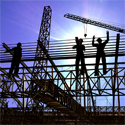Good News Forecast for Non-Residential Construction: Solid Growth Ahead
Posted by Rose Ann Woolpert on Mar 18, 2015
 In a June 26, 2013 report on United States construction trends, Goldman Sachs, the New York-based investment banking, securities and investment management firm, predicted solid growth in non-residential construction through 2015. Despite a recent rise in long term interest rates, Goldman Sachs advisors point to improvements in commercial property pricing and occupancy rates, and the positive impact of shale oil production on domestic manufacturing growth, as predictors of increases in non-residential construction. Analysis of the past 20 years also demonstrates that interest rate increases can coincide with commercial construction development. Construction loans utilize short-term rates, which are expected to remain stable until 2015.
In a June 26, 2013 report on United States construction trends, Goldman Sachs, the New York-based investment banking, securities and investment management firm, predicted solid growth in non-residential construction through 2015. Despite a recent rise in long term interest rates, Goldman Sachs advisors point to improvements in commercial property pricing and occupancy rates, and the positive impact of shale oil production on domestic manufacturing growth, as predictors of increases in non-residential construction. Analysis of the past 20 years also demonstrates that interest rate increases can coincide with commercial construction development. Construction loans utilize short-term rates, which are expected to remain stable until 2015.
Despite slow construction spending in the first half of this year, commercial property occupancy prices and rates actually accelerated during the period. Since these are the primary indicators driving nonresidential construction capital expenditures, advisors believe this sector is in the early stages of recovery. Although commercial construction spending is up only 2% year to date, vacancy rates are low and average prices have increased. Office and lodging construction are other indicators of construction spending, and their recovery remains strong. Steady employment growth has been a key to these improvements.
Advisors expect “manufacturing construction spending to accelerate significantly over 2014-15 as healthy manufacturer returns and tightening capacity utilization amid rising industrial production spur investment in new facilities.” Additionally, “the impact of shale production on US cost competitiveness translates into a US chemical capital expenditure renaissance driving a significant tailwind to manufacturing construction in 2014-15.” Capacity utilization has tightened, industrial production is rising and capital expenditures are increasing.
Based on analysis of the past two decades, there does not seem to be a correlation between periods of rising interest rates and non-residential construction spending. In the past, steady interest rate increases did not derail construction recoveries. It appears that government interest rate policy is focused on moderating inflation. “While rising long-term rates has led to an increase in borrowing costs for long-term loans tied to real estate, such as residential mortgages or commercial real estate loans, we would note that rates on construction and development loans, which more directly impact construction activity growth, are based off short-term rates, which have remained flat at their lowest historical levels.”
Back to all Blogs
